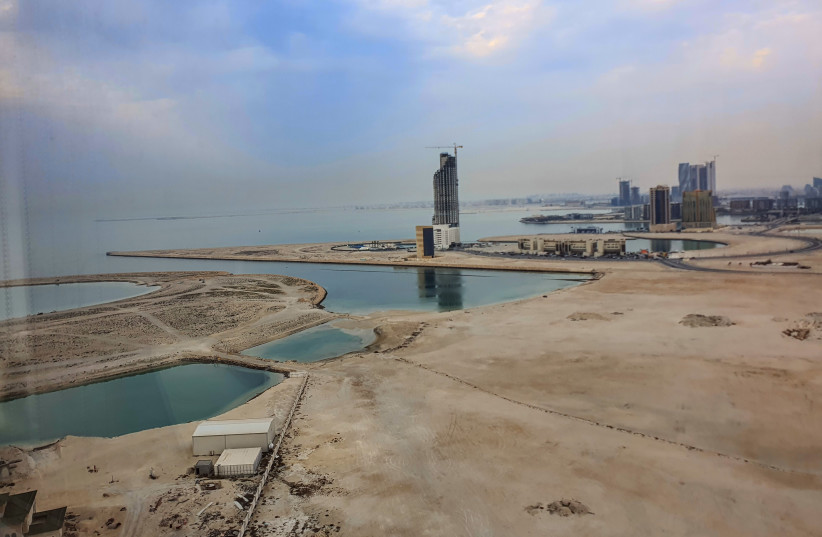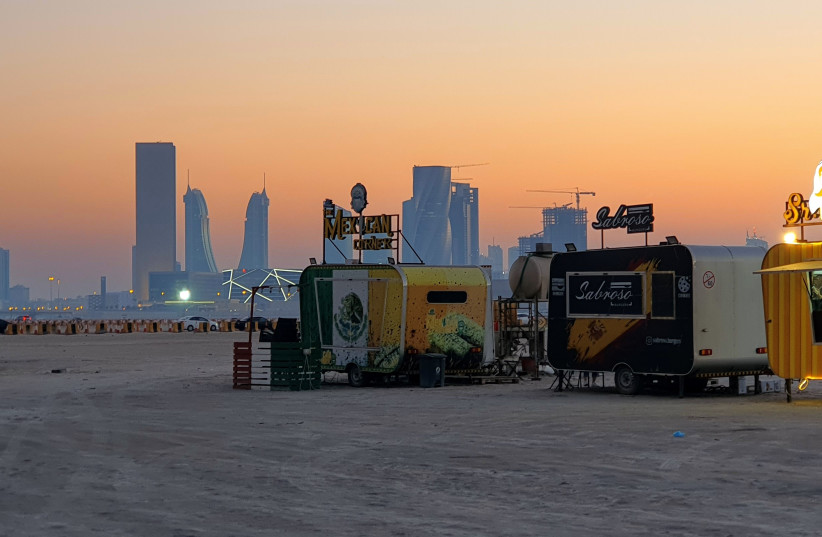In the long run, a Middle East alliance for water sustainability can have a positive impact on saving the Dead Sea, which is lacking regional cooperation.
By NOAM BEDEIN
Published: MAY 7, 2022

(photo credit: Noam Bedein, #MiddleEastEcotourism)
Recently I returned from an eco-water exploration journey of the second Arab state in the Middle East that recently signed normalization agreements with Israel – the Kingdom of Bahrain.
The Bahrain Embassy in Tel Aviv connected me to professionals and key officials in the kingdom who examine the ocean, water and environment conservation. This enabled me to explore the kingdom in an environmentally focused manner, creating an unmediated encounter with key Bahrainis.
I learned firsthand about the historical water-cultural identity, which was lost in some ways to the average Bahraini. It became immediately apparent that the challenge to save the Dead Sea could create empathy with the locals on a deeper level, referring to Bahrain’s lost water treasures and resources which are in great need of protection and rehabilitation.
In the long run, a Middle East alliance for water sustainability can have a positive impact on saving the Dead Sea, which is lacking regional cooperation.
I ARRIVED in Bahrain on February 14, which a decade ago marked the date of the Arab Spring that ignited the Middle East, including Bahrain. It was also called “The Day of Rage,” a name given by protesters in Bahrain. As I strolled around the shuk in Manama on my first evening, gatherings for memorials near a Shi’ite mosque were held amid a heavy police presence.

On this symbolic day, Prime Minister Naftali Bennett made a historic visit to the king of Bahrain, Hamad bin Isa al-Khalifa, and the heir apparent, the prime minister of Bahrain, Salman bin Hamad al-Khalifa.
This was the first time an Israeli prime minister ever visited the Kingdom of Bahrain, so almost all the local newspapers in Bahrain covered the visit in colorful front pages. Saving copies of the Bahrain media was a way to preserve historic moments for posterity.
THROUGHOUT HISTORY, Bahrain has been called the “Land of Immortality” or “the Great Paradise,” as it was known for its freshwater springs and palm tree fields. The name of Bahrain in Arabic means “between two seas.” Two types of water surround the land – freshwater and saltwater.
The Kingdom of Bahrain has deep historical roots, dating back more than 5,000 years, as it has been home to many cultures as well as a vital link between cultures, making it a commercial center and a sea crossing point between East and West, strategically located in the Arabian Gulf.
Bahrain has been well known since ancient times for its pearl fishing, which was considered the best in the world until the 19th century.
Today there are no rivers, streams flowing continuously, or lakes.
Accelerated economic development and population growth along with mega projects built in Bahrain in recent decades, mainly due to the oil boom, have increased the demand for water, as groundwater is used as the only natural water resource supported by desalination facilities.
More water is expected to be extracted from the reservoirs to meet the growing demands for domestic, agricultural and industrial needs that will cause an increase in salinity due to the intrusion of more saline water from the sea.
Bahrain is among the top 10 countries in the world that could suffer from a water crisis in the next 25 years. The Kingdom of Bahrain is an arid state that has been declared by the UN agencies since the 1950s to be accepted as a water-scarce region.
The Kingdom of Bahrain, despite being the smallest in the Arab Gulf Cooperation Council (GCC), contains one of the highest population densities in the world and its population is growing. It also has the lowest freshwater resources in the world, which affects the availability of freshwater. The share of freshwater among the population of Bahrain is declining.
In recent decades, extensive coastal development carried out in the Arabian Gulf has included excavations, restoration; it has also shut down projects and underwater piping facilities, and caused extensive pollution. These are the main factors in the displacement of corals across the bay, which has had a devastating impact on the marine environment.
In recent years, a questionnaire was distributed among students of the National University of Bahrain. Eighty-five percent of the respondents were unaware of the kingdom’s serious water problems; they thought that there wasn’t a water problem, since Bahrain is an island surrounded by water (sea water).
ONE OF the highlights of the eco-trip to Bahrain was engaging with marine biologists from the Reef Arabia, who are constantly developing practical reduction and compensation solutions to deal with the severe impacts on the Gulf; they are tasked with the planning, building and deployment of artificial reefs.
Reef Arabia has suggested that an artificial reef can do more than provide a utilitarian habitat for fish species. When properly designed, it blends in with the environment in a natural and aesthetic way.They combine their vast knowledge of the ecology of the Arabian Gulf with innovative methodologies for the production of concrete reefs, which integrate naturally and beautifully into the absorbing environment.
Halel Engineer, director and manager of Reef Arabia, is also one the kingdom’s main consultants and leaders of ocean and marine conservation in Bahrain. Engineer grew up with the Bahraini Ambassador to Israel, Khaled Yousif al-Jalahama, who initially connected us.
Thanks to Bennett’s visit, the following morning I was privileged to have my very first Bahraini traditional breakfast at the shuk with Engineer and her sister; joining us was Ambassador al-Jalahama, who was tired from Bennett’s historic visit, but seemed very pleased, positive and optimistic for the future.
My trip included a meeting with Israel’s Ambassador to Bahrain, Eitan Na’eh, and an official meeting at the Bahrain Supreme Council for Environment. I summarized my ecological journey across Bahrain, pointing out the immediate need to create environmental-water awareness and water-sustainability education, which must be supported by the Bahraini kingdom.
In order to reach sustainable solutions, the general public needs to care – first and foremost.
There are many challenges for Bahrain’s ocean and marine conservation. Cooperation between Israel and Bahrain to preserve and sustain the water environment also brings hope for solutions that will preserve water treasures connected to the heritage and identity of our people. ■
The writer, a photojournalist and environmental-arts activist, is founder and director of the NGO, The Dead Sea Revival Project.
https://www.jpost.com/environment-and-climate-change/article-705926
